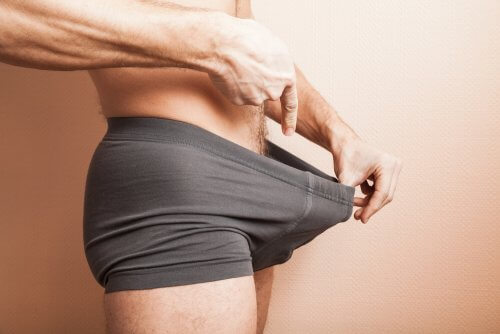Small Penis Complex: Does Size Really Matter?

A small penis is a worrisome factor for the sexual life of many men. However, as per the words of Mark Twain, what truly matters “is not the size of the dog in the fight, but the size of the fight in the dog.”
As with small breasted-women, this self-consciousness arises for one main reason: cultural pressure. Since big breasts and big penises have often been associated with fertility since ancient times, this mistakenly makes size seem more important than it really is.
In reality, fertility and pleasure are dictated to a great measure by the quality of intimacy between partners and also by the quality of their health. That said, masculinity is measured by many, many other factors.
So, with that in mind, is a small penis truly a serious problem?
The size of a flaccid penis varies, and it also changes depending on the temperature of a place and the emotional state of a man. When there’s no arousal, stress, anxiety, and effort are all variables that affect the volume of an erection. That said, it should be noted that the size of a flaccid penis is not related to its erected size.
That’s why men should always remember that size of an erect penis may be very different than the size of the penis they’re seeing in the gym or bathroom. That’s why it’s important never to compare.

Small Penis Complex
First of all, let’s talk about body dysmorphic disorder, a disorder in which a person experiences anxiety or depression due to an – often just perceived – bodily default.
However, this psychological condition typically has nothing to do with the size of a penis: M who suffer from it usually have normal penises. That said, there are also men in a good psychological shape whose penis is rather small, but it doesn’t affect them.
In order to avoid having to confront their small penis complex, certain men avoid going to certain places such as changing rooms, pools, and even avoid any activities that might lead them to feel forced to undress in public.
Read this article: Tips for How to Improve Male Fertility
Conditions Associated with the Size of a Penis
First of all, it’s important to keep in mind that in the majority of cases, a man who perceives his penis to be small often in reality has a normal-sized penis.
That said, there are a few rare diseases that do affect penis size.
Among the most frequent anomalies is the curvature of the penis, there’s one called Peyronie’s disease. In this condition, the penis interferes with penetration because the curvature excessively tilts downward. However, this condition can be corrected with penis extension or surgery.
Another congenital disorder by the name of hypospadias happens in the external urethral orifice (also known as urinary meatus). It’s not usually a significant problem, and surgery isn’t necessary unless men can’t ejaculate or urinate.
While absence of external testicles seldom occurs, when it does, it’s easily corrected right after birth.
Finally, there is a condition called microphallus (not to be confused with their homonym parasite mollusks) which is also referred to as micropenis. In general, it refers to a penis with a length 2 3/4 inches or less when erected in a fully developed, adult man. This is, however, quite rare.

Associated Psychological Effects
The size of a penis can impact men psychologically and cause trauma. These are some of the emotional consequences of this condition:
- Wardrobe syndrome. As we mentioned above, this is a concern for many men. The idea of comparing their own penis to those of other men,only to find out that theirs may be smaller frightens them. Thus, to avoid this, they avoid public situations where this may happen.
- Fear of relationships. It’s very common for men to be afraid at the moment of falling for someone who might possibly reject them.
- Low self-esteem.
- Insomnia or other sleeping disorders.
- Fear of humiliation and ridicule.
Discover: 8 Aphrodisiacs For Men
What Can You Do?
Before even considering any penis enlargement techniques, keep in mind that the size of your penis doesn’t have to do with a pleasant sexual relationship and that it’s more important to lead a healthy lifestyle.
Try to avoid and prevent the following:
- Obesity. Balance your daily diet and avoid excessive consumption of packaged processed food and drinks. Furthermore, opt for fresh foods instead.
- Tobacco and alcohol. These both prevent the expansion of blood vessels and so it impairs the blood flow into the corpora cavernosa.
- Narcotics and other drugs. Drugs can reduce the size of the penis.
- Certain physical exercise that isn’t healthy for a penis. In particular, those that involve a blow to or a sudden movement of the genital area (like cycling) might damage the penis tissue.
- An excess of pressure, such as tight trousers or pants, or a forced unnatural posture.
In conclusion, accepting oneself is an indispensable requirement for mental health and to lead a good life in general. Yes, this attitude can be threatened by the environment in which we develop and particularly through the strong, toxic advertising campaigns that incite us to hate ourselves so we can buy their magic products. But don’t let this trick you.
Furthermore, consulting an andrologist might help men overcome any doubts and concerns they might have in regard to the size of their penis.
All cited sources were thoroughly reviewed by our team to ensure their quality, reliability, currency, and validity. The bibliography of this article was considered reliable and of academic or scientific accuracy.
- Wylie, K. R., & Eardley, I. (2007). Penile size and the “small penis syndrome.” BJU International. https://doi.org/10.1111/j.1464-410X.2007.06806.x
- Lever, J., Frederick, D. A., & Peplau, L. A. (2006). Does size matter? Men’s and women’s views on penis size across the lifespan. Psychology of Men and Masculinity. https://doi.org/10.1037/1524-9220.7.3.129
- Veale, D., Miles, S., Bramley, S., Muir, G., & Hodsoll, J. (2015). Am i normal? A systematic review and construction of nomograms for flaccid and erect penis length and circumference in up to 15 521 men. BJU International. https://doi.org/10.1111/bju.13010
This text is provided for informational purposes only and does not replace consultation with a professional. If in doubt, consult your specialist.








